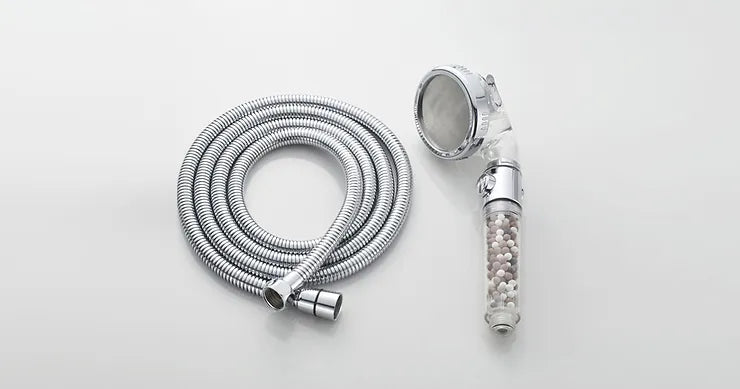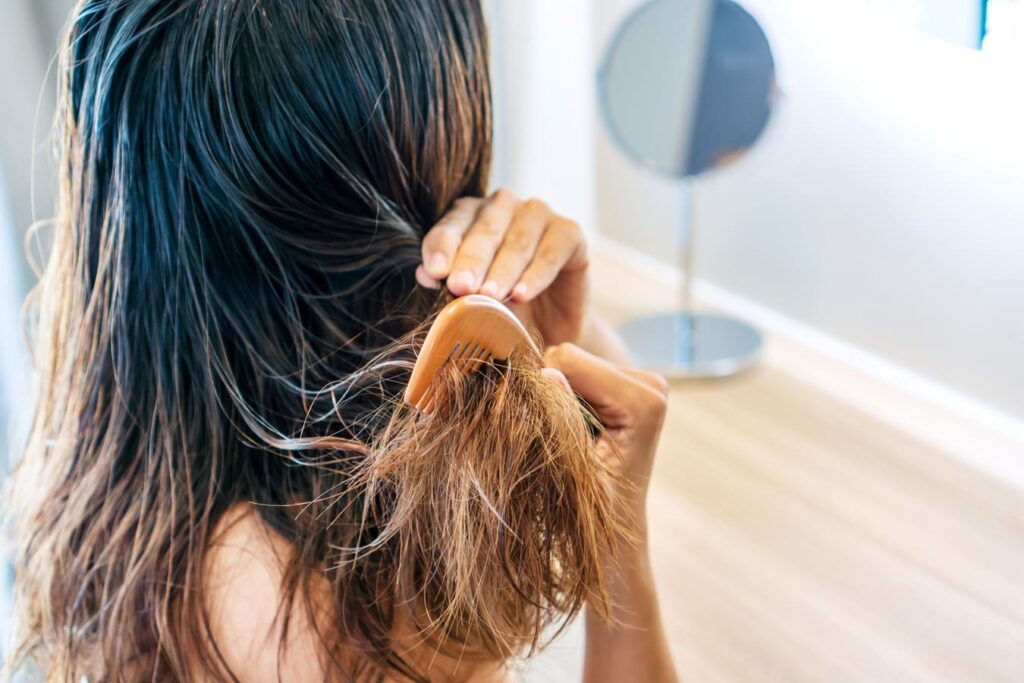Replacing your shower hose and shower head are two things that you’ll have to do at least once in your shower’s lifetime. Luckily, if you have a handheld, wall mounted shower unit or mixer taps, you won’t need to call a plumber — you can do the replacing on your own! On the other hand, if you have a rainfall shower or any other type that doesn’t have an easily detachable hose and head, you will probably need to call in a professional (unless you know exactly what to do).
In this article, we'll look at by far the commonest domestic shower setup — a simple wall-mounted shower with a flexible hose and handheld head. So, why would we want to replace these two items?
Well, sometimes the shower hose becomes damaged at the point where it joins the shower, resulting in a water leak. Not only does this reduce pressure at the shower head, resulting in a less enjoyable shower experience, but it also causes an unsightly accumulation of limescale (especially if your area has hard water). And of course, leaks anywhere in the plumbing system waste a lot of water, which means you aren’t getting the benefit of all the water you’re paying for. Plus, it's generally bad to waste a precious, finite resource like water.
Over time, the grooves along the hosepipe accumulate dirt and thus must be washed properly in order to avoid a grimy appearance and maintain hygiene. If you have to do this, then it’s far easier to remove the hose from the unit and wash the surface in a bowl of hot water and detergent.
Similarly, the shower head might accumulate dirt or limescale, needing a thorough cleaning. By the way, we have an article dedicated to this topic! It’s always easier to do the cleaning when the shower head has been stripped down into its component parts and left to soak in a bowl of hot soapy water.
Furthermore, you might also havreplace your shower headen the shower head and hose — this will need attention just like the joint between the hose and shower unit. Remember, you won’t always need to replace your shower accessories. If you have a relatively new shower head and hose and they just need some mild cleaning, then all you have to do is dismantle and clean. If, however, you see a build-up of limescale or want to upgrade an old shower head, then consider buying a new shower head and hose. They aren’t expensive, and you’ll immediately notice the improved shower experience.
Of course, you might decide to replace your showerhead with a newer model that filters limescale, solids, and other impurities from your water supply. If this is the case, you need to remove your old shower head and dispose of it according to local and national waste disposal regulations. When you’re replacing your old shower head, it’s a good idea to replace your old hose as well in order to keep everything uniform and functioning correctly.
Preparation for Shower Head and Hose Replacement
You obviously need to enter the shower area to get to the shower unit. Therefore, ensure that the shower tray is dry and not slippery. A fall will not only cause damage to the shower unit and cubicle but will also injure you quite badly.
There’s a good chance that some water must have accumulated inside the shower hose. So, before dismantling the hose from the shower unit, place an old towel under the unit to catch and soak up any water.
Before we start taking off the old hose, remember that even though the fittings might look the same, some shower manufacturers have their own hose fittings specifications. The cones on the end of the hose thus might not fit properly, resulting in leaks. This can be very annoying, so it’s worth getting a new hose from the same manufacturer. Otherwise, get a shower hose that has a universal fitting.
How to Change a Shower Hose
Ok, let’s assume you’ve got a replacement hose and you’re ready to go.
First, remove the old showerhead from the hose by turning the connecting cone anti-clockwise. You may need help with this so place a rag around the cone and use a pair of pliers. Remove the head and place the old washer somewhere safe.
Then, turn the hose fitting that’s screwed onto the shower unit anti-clockwise. This might be difficult because of problems with access, how long the hose has been installed, and whether there’s any limescale build-up around the joint. Ideally, you should be able to unscrew this by hand too, but if not, wrap an old rag around the cone and grip it using a pair of pliers.
After unscrewing the hose, remove it and set it aside, taking care to retrieve the sealing washer for use later.
How to Replace a Shower Head
Remove your new shower head from its packaging. Sometimes, especially if the shower head contains filtering granules like Stone Stream© products, you’ll have to remove the safety cap on the end of the shower head. Insert the sealing washer into the open end of the new hose. If you wish, you can use one of the old washers together with a new one to provide a good watertight seal. Old washers are always useful for doing this. However, if the old washer is broken or is no longer flexible, discard it.
While we’re talking about this, it's important to note that the fittings at each end of the shower hose are not interchangeable. One end will only fit the shower head and the other will only fit the shower unit. Be guided by the installation instructions supplied by the manufacturer. They are invaluable!
Then, tighten the cone onto the shower head. You have now connected the shower head to the shower hose.
To make it even easier for you, we've prepared this demonstration video. It’s a simple step-by-step guide to show you how to install or replace a shower head:
How to Connect a New Hose
Hold your new hose and place a sealing washer at the open end that fits onto the shower unit. Screw this cone onto the threaded fitting until it is hand tight. It’s worthwhile reading the installation instructions that came with the hose so that you install it properly with less chance of a leak.
If the old washers are intact and still flexible you can, if you wish, use an old washer with a new one to double seal the joint. This will help make sure the joint is completely watertight.
Turn on the shower at a low flow rate setting to test the joint. There should be no leaks around either cone. If there are any leaks, tighten the cones a bit more. either by hand or by wrapping a rag around them and using pliers. Don’t tighten too much — the threads are usually made of plastic and may become damaged if you tighten them more than necessary.
Once again turn on the shower to test for any leaks. If there are no leaks anywhere, you can wipe down the unit, new hose, and new head to remove all traces of water.
Get out of the shower tray and take your tools with you. Finally, wipe down any footprints that might be on the shower tray.
You can now congratulate yourself on a job well done, and be thankful you didn’t have to pay a plumber to do this simple task!
Now, if you're still confused, don't worry. We have another video to take you through the steps of installing or replacing a shower hose:
Buying a New Shower Head
You now know how to change an old shower hose and shower head. Since you're still here, it’s probably worthwhile thinking about what type of new hose and head you should buy. Many domestic hot water supplies contain foreign particles, pieces of rust, limescale, and all manner of impurities that can damage your bathroom setup and fixtures. If you want an efficient and pleasant showering experience, you should buy a shower head that filters all unnecessary particles out of running water.
Depending on what type of water or shower problems you have, StoneStream© offers shower heads that both soften and filter your water. With a water filtering and water softening shower head, you will feel like you're bathing in natural spring water!
Additionally, shower heads that filter and soften water will effectively reduce the amount of chlorine, bacteria, and dirt in running water. The filters in the shower head will also trap and remove mineral build-up and other impurities. You only need to replace the filters every six months and you can easily get the replacement filters from us!
StoneStream EcoPower ShowerHead

Buy Now
Buy a new, modern shower head and you’ll have a satisfying showering experience knowing that you’re dealing with clean water that's good for your skin, hair, bathroom fixtures, and shower accessories.
So, head over to the StoneStream© website today to shop for shower heads and shower accessories that are eco-friendly, long-lasting, and cost-efficient!



